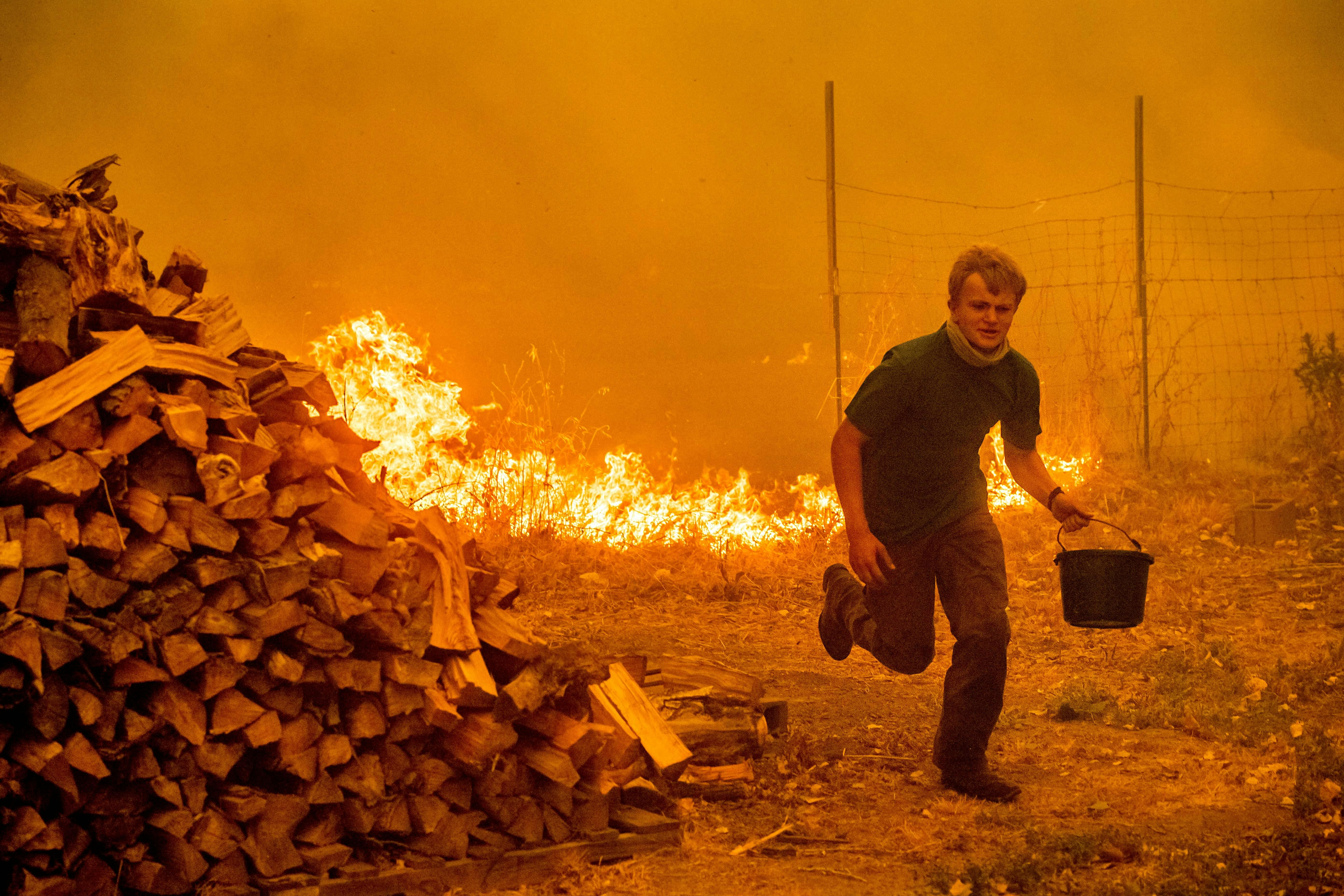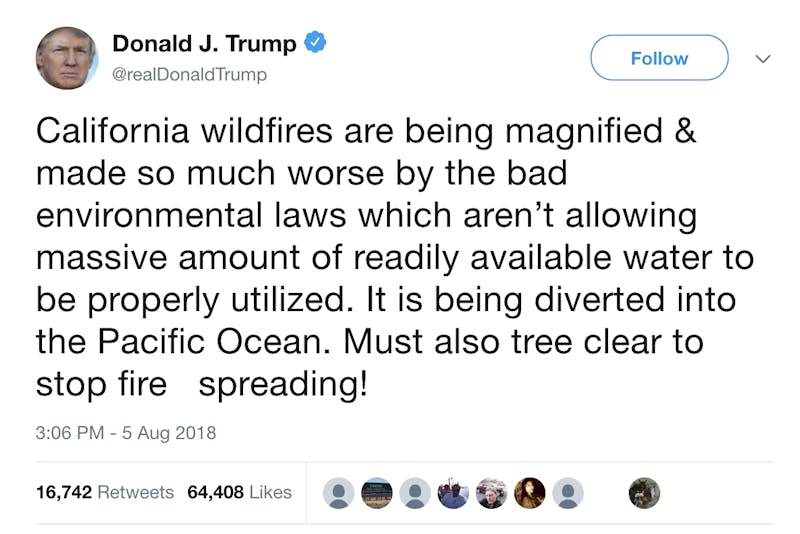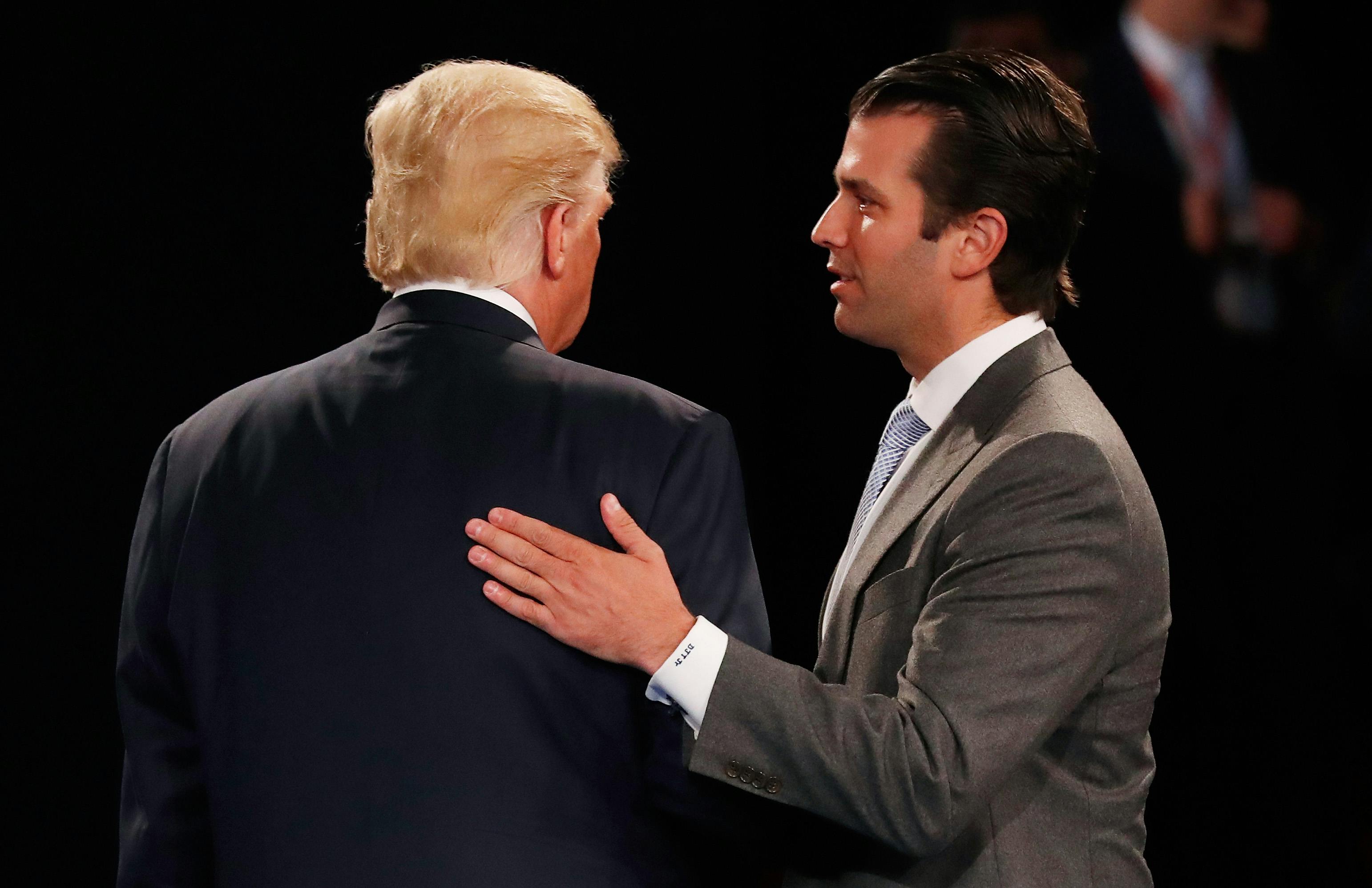
Last year was the deadliest and most destructive wildfire season in California’s history. But that soon could change. As the state enters the peak month of fire season, wildfires have already burned more than 290,000 acres and killed eight people. This time last year, only about 220,000 acres had burned, and no one had died. The 2017 season would eventually claim 44 lives.

Why are these wildfires so bad, and why do they seem to be getting worse over time? President Donald Trump offered his opinion in a Sunday night tweet, writing that “bad environmental laws” have been diverting water away from firefighting efforts. He also wrote that the state “must tree clear to stop fire spreading!” (Hours later, he deleted the tweet and tweeted a near-identical version.)
There is an ongoing debate about the merits of “thinning” forests to reduce wildfires, but a lack of available water? That’s not a common complaint of wildfire experts, who instead point to extreme drought and heat, human development in vulnerable areas, and an outdated federal funding system for firefighting.
Presented with Trump’s tweet, the state firefighting agency said it had “no idea” what Trump was talking about. “We have plenty of water to fight these wildfires,” Daniel Berlant, assistant deputy director of Cal Fire, told The New York Times, “but let’s be clear: It’s our changing climate that is leading to more severe and destructive fires.”
What “bad environmental laws” did Trump have in mind, then? On Monday afternoon, he elaborated—sort of.
Governor Jerry Brown must allow the Free Flow of the vast amounts of water coming from the North and foolishly being diverted into the Pacific Ocean. Can be used for fires, farming and everything else. Think of California with plenty of Water - Nice! Fast Federal govt. approvals.
— Donald J. Trump (@realDonaldTrump) August 6, 2018Some reporters have speculated that Trump is referring to endangered species protections—most importantly, the federal Endangered Species Act. These laws prohibit farmers and other industrial sources from taking lots of water from certain rivers and streams, in order to protect the habitats of endangered fish. Trump is currently seeking to dramatically weaken the Endangered Species Act, so it’s possible he wanted to bolster his administration’s case by linking the federal law to wildfires.
But I think Trump’s tweets reference something more specific: His administration’s escalating attempts to prevent California from regulating its own water systems.
California’s State Water Resources Control Board is expected soon to implement a plan to prevent the imminent collapse of fisheries in the state’s largest estuary. This plan—nine years in the making—would limit water use “in three tributaries to the San Joaquin River, which joins with the Sacramento River to feed into the delta, a key California water source and home to endangered species such as the Chinook salmon,” Pacific Standard reported last month. More water would flow through the system as a whole, so some water would inevitably flow into the ocean, as Trump notes.
Many farmers are opposed to this policy, claiming limits on water use would hurt the agricultural economy. Enter the Trump administration. Last month, Interior Secretary Ryan Zinke travelled to two reservoirs in the Northern San Joaquin Valley, where he told reporters that his agency may intervene. “There is a federal interest—the federal interest as the water master,” he said. He was joined by Republican Congressman Jeff Denham, who called the state’s water conservation proposal a “disastrous plan to flush water from valley rivers to the ocean,” foreshadowing the language Trump would eventually use in his Sunday tweet.
Denham has attempted, on several occasions, to enlist the federal government’s help in halting California’s new plan. Most recently, he tucked legislation to stop it in a spending bill for the Department of Interior. Now, he has Zinke and the Trump administration in his corner. Last Friday, the Department of the Interior’s Bureau of Reclamation commissioner sent a letter to California’s water board threatening possible legal action if the plan is adopted.
Republicans like Zinke and Denham have long argued that water conservation policies are the real cause of California’s drought—that environmentalists, not climate change or overuse, are to blame for water shortages. But they have never gone so far as to suggest, as Trump did on Monday, that environmentalists are the real reason that wildfires are raging out west. That’s especially concerning because people have died in those fires, as many more likely will. Inventing a bogeyman won’t change that. Only smart policies will.

Since the Russia investigation began, a single question has loomed over it: How will this end? Will special counsel Robert Mueller provide enough evidence to Congress to justify impeachment charges? Or President Donald Trump try to stop Mueller from doing so by triggering a repeat of the Saturday Night Massacre? The most persistent of these questions is also the most pernicious one: Is there a smoking gun that would decisively prove that Trump colluded with Russia to help him win the 2016 election?
Some journalists and observers believe that Trump provided them with one, or at least something close to it, in a tweet on Sunday morning.
Fake News reporting, a complete fabrication, that I am concerned about the meeting my wonderful son, Donald, had in Trump Tower. This was a meeting to get information on an opponent, totally legal and done all the time in politics - and it went nowhere. I did not know about it!
— Donald J. Trump (@realDonaldTrump) August 5, 2018Trump’s tweet is apparently a response to a Washington Post article about his turbulent state of mind lately. Trump, the paper reported, “has confided to friends and advisers that he is worried the Mueller probe could destroy the lives of what he calls ‘innocent and decent people,’” chief among them his eldest son, Donald Trump Jr. “As one adviser described the president’s thinking, he does not believe his son purposefully broke the law, but is fearful nonetheless that Trump Jr. inadvertently may have wandered into legal jeopardy.”
It’s the latter half of Trump’s tweet, though, that drew the most attention: the acknowledgment that Trump Jr., as well as campaign chairman Paul Manafort and Trump son-in-law Jared Kushner, met with a Russian lawyer at Trump Tower in 2016 “to get information on an opponent,” namely Hillary Clinton. Some journalists saw this as a direct refutation of Trump’s frequent denials of wrongdoing. The Huffington Post reported that the president “finally admits his campaign colluded with Russia at [the] Trump Tower meeting.” The Post’s Jennifer Rubin called the tweet “a gift to prosecutors.” The New Yorker’s Adam Davidson even compared it with the release of President Richard Nixon’s “smoking-gun tape” 44 years earlier to the day, framing it as a signal moment in Trump’s presidency.
It was possible, just days ago, to believe—with an abundance of generosity toward the President and his team—that the meeting was about adoption, went nowhere, and was overblown by the Administration’s enemies. No longer. The open questions are now far more narrow: Was this a case of successful or only attempted collusion? Is attempted collusion a crime? What legal and moral responsibilities did the President and his team have when they realized that the proposed collusion was underway when the D.N.C. e-mails were leaked and published? And, crucially, what did the President know before the election, after it, and when he instructed his son to lie?
While the president’s latest tweet is noteworthy, it’s at risk of being overanalyzed. Trump’s characterization of the Trump Tower meeting is consistent with what the public has known since last summer, when Trump Jr. posted incriminating excerpts from an email conversation with Rob Goldstone, a British music publicist who worked for the son of a Russian oligarch. In that conversation, Goldstone told Trump Jr. that his employer could “provide the Trump campaign with some official documents and information that would incriminate Hillary and her dealings with Russia and would be very useful to your father.” He made clear that this information came directly from Russian government officials and that it was “part of Russia and its government’s support for Mr. Trump.” The president’s eldest son welcomed the offer, writing that “if it’s what you say I love it.” It’s hard to get more conclusive than that.
If anything, Trump’s tweet highlights the extent to which he and his allies can’t get their record straight about that meeting. In a statement in July of last year, after the news broke about the meeting, Trump Jr. insisted that it “was a short introductory meeting. I asked Jared and Paul to stop by. We primarily discussed a program about the adoption of Russian children that was active and popular with American families years ago and was since ended by the Russian government, but it was not a campaign issue at the time and there was no follow up.” His father reportedly played a role in the crafting of the statement. But the following week, Trump Sr. tweeted a different defense—one similar to what he tweeted this past weekend:
Most politicians would have gone to a meeting like the one Don jr attended in order to get info on an opponent. That's politics!
— Donald J. Trump (@realDonaldTrump) July 17, 2017A week after that, Trump insisted, “I did NOT know of the meeting with my son.” That claim hasn’t been disproven, but Trump Jr.’s phone records show that he called a blocked number at Trump Tower on June 6 while setting up the June 9 meeting. Later that night, the elder Trump told a campaign rally audience in New York that he would give a speech the following week on “all of the things that have taken place with the Clintons.” The curious timing raises questions about whether Trump Jr. told his father about the planned meeting and whether then-candidate Trump approved it.
The Trump Tower meeting itself is already a matter of interest to Robert Mueller. He is still reportedly trying to interview Emin Agalarov, Goldstone’s client and the meeting’s facilitator. The special counsel’s office has questioned multiple witnesses about the circumstances surrounding the meeting, as well as Trump’s role in crafting his son’s statement about it. Michael Cohen, Trump’s former personal attorney, is even reportedly willing to testify that Trump knew about the meeting in advance, which could undermine Trump’s tattered defenses even further.
All of this is already pretty damning. So why was Trump’s tweet treated like a major development in the Russia saga? One answer may lie in the expectations set by past presidential scandals.
Nixon might well have survived the Watergate crisis but for the White House taping system, which provided undeniable proof of his complicity in the cover-up. Most of Watergate’s closing stages—the Saturday Night Massacre, the back-and-forth negotiations with Congress, the Supreme Court’s landmark ruling on executive privilege—revolved around whether those tapes would become public. Once they were, Nixon resigned within days.
Ken Starr’s sprawling investigation into President Bill Clinton’s scandals also failed to turn up a smoking gun until 1998, when Linda Tripp revealed that White House intern Monica Lewinsky had preserved her blue dress after a sexual encounter with the president. A DNA sample from the dress conclusively proved Clinton had lied in denying he had a sexual relationship with Lewinsky. The House of Representatives impeached Clinton for perjury and obstruction of justice later that year, while the Senate acquitted him of the charges in 1999.
Not every investigation turns up evidence that directly implicates a president, however. Inquiries into the Iran-Contra affair in the late 1980s uncovered plenty of wrongdoing by high-level officials in Ronald Reagan’s administration. What it ultimately failed to find was any direct proof that Reagan had sanctioned the illegal diversion of funds to support Nicaraguan rebels. The Tower Commission concluded in 1987 that Reagan “clearly didn’t understand the nature of this operation. Independent counsel Lawrence Walsh’s final report in 1994, six years after Reagan left office, sharply criticized the former president but found insufficient evidence to warrant criminal charges.
Ultimately, the frenzied search for a single piece of evidence that proves Trump illegally colluded with Russia works in his favor. It creates a public expectation that will be difficult for Mueller to meet, thereby setting the stage for disappointment when the inquiry concludes. In doing so, it minimizes the considerable amount of evidence that’s already public: Trump’s supine performance at last month’s Helsinki summit with Vladimir Putin, the constant outreach efforts between the Trump campaign and Russian intermediaries throughout the 2016 election, the sudden dismissal of FBI Director James Comey last May, the persistent efforts to discredit and shut down investigations into what really happened, and so much more.
If this story were a film, it would build to a thrilling climax in which a final bombshell revelation brings down the White House and Mueller walks off into the sunset (or perhaps starts tweeting and writes a book). Real life, however, is rarely so tidy. By holding out for a smoking gun, Trump’s critics may be downplaying the gunpowder residue that’s already coating his hands.
 Google whistleblower told TheIntercept that Google secretly intends to bring its search engine back to China as part of project "Dragonfly," a mobile search that will deliver heavily-censored results to Chinese users.
Google whistleblower told TheIntercept that Google secretly intends to bring its search engine back to China as part of project "Dragonfly," a mobile search that will deliver heavily-censored results to Chinese users.
No comments :
Post a Comment